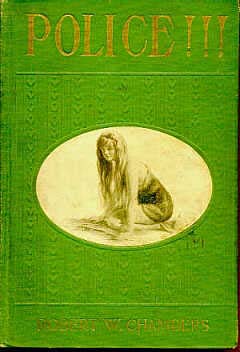On a beautiful day in
spring as I was running as hard as I could run pursued by the New York
police and a number of excited citizens, my mind, which becomes brilliantly
active under physical exhilaration, began to work busily. I
thought about all sorts of things: I thought about hard times and financial
depression and about our great President who is in a class all alone with
himself and soon to become extinct; I thought about art and why here
isn’t any when it’s talked about; I thought of macro-lepidoptera, of metagrammatism,
monoliths, manicures, and monsoons.
And all the time I was running
as fast as I could: run; and the faster I ran the more things I thought
about until my terrific pace set my brain whizzing like a wheel.
I felt no remorse at having published
these memoirs of my life—which was why the police and populace were pursuing
me, maddened to frenzy by the fearless revelation of mighty scientific
truths in this little volume you are about to attempt to read. Ubicumque
ars ostentatur, veritas abesse videtur!
I thought about it clearly, calmly,
concisely as I fled. The maddened shouts of the prejudiced populace did
not disturb me. Around and around the Metropolitan Museum of Art
I ran; the inmates of that institution came out to watch me and they knew
at a glance that I was one of them for they set up a clamor like a bunch
of decoy ducks when one of their wild comrades comes whirling by.
“Police! Police!” they shouted; but I went careering on uptown, afraid
only that the park squirrels might club together to corner me. There
are corners in grain. Why not in—but let that pass.
I took the park wall in front
of the great Mr. Carnegie’s cottage at a single bound. He stood on his
terrace and shouted, “Police!” He was quite logical. The Equal
Franchise Society was having a May party in the park near the Harlem Mere.
They had chosen the Honorable William Jennings Bryan as Queen of the May.
He wore low congress-gaiters and white socks; he was walking under a canopy,
crowned with paper flowers, his hair curled over his coat collar, the tips
of his fingers were suavely joined over his abdomen.
The moment he caught sight of
me he shouted, “Police!”
He was right. The cabinet
lacked only me.
And I might have consented to
tarry—might have allowed myself to be apprehended for political purposes,
had not a nobler, holier, more imperative duty urged me northward still.
Though all Bloomingdale shouted,
“Stop him!” and all Matteawan yelled, “Police!” I should not have consented
to pause. Even the quackitudinous recognition spontaneously offered
by the Metropolitan Museum had not been sufficient to decoy me to my fellows.
I knew, of course, that I could
find a sanctuary and a welcome in many places—in almost any sectarian edifice,
any club, any newspaper office, any of the great publishers’, any school,
any museum, I knew that I would be welcomed at Columbia University, at
the annex to the Hall of Fame, in the Bishop’s Palace on Morningside Heights—there
were many places all ready to receive, understand and honour me.
For a sufficiently crippled intellect,
for a still-born brain, for the intellectually aborted, there is always
a place on some editorial, sectarian, or educational staff.
Try It!
But I had other ideas as I galloped
northward. The voiceless summons of the most jealous of mistresses was
making siren music in my ears. That coquettish jade, Science, was
calling me by wireless, and I was responding with both legs.
And so, at last, I arrived at
the Bronx Park and dashed into the Administration Building where everybody
rose and cheered me to the echo.
I was at home at last, unterrified,
undismayed, and ready again as always to dedicate my life to the service
of Truth and to every caprice and whim of my immortal mistress, Science.
But I don’t want to marry her.
Magna est veritas! Sed major
et longinquo reverentia.
....
[1] Central
Park, filthiest, cruellest and most outrageous of zoological exhibitions.

